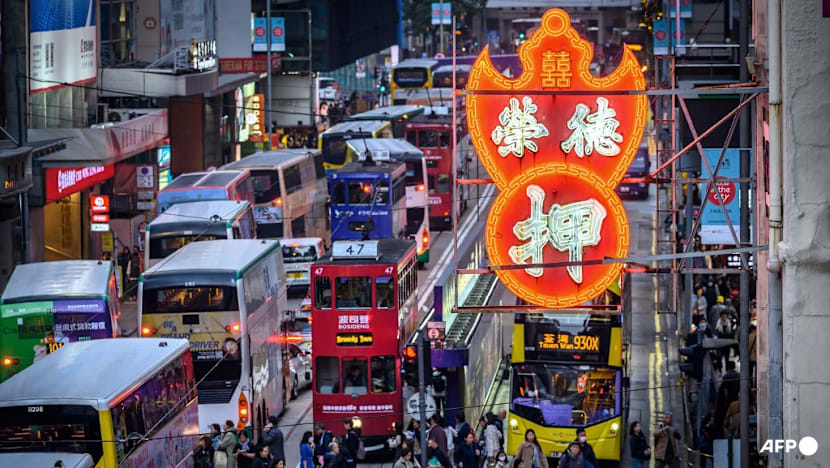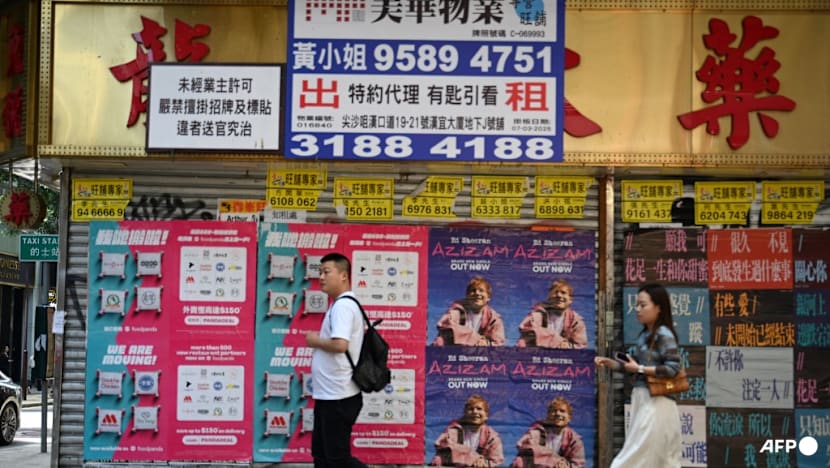Commentary: Is Hong Kong still ‘Asia's World City’?
As China prepares for a key meeting to discuss its next five-year plan, repositioning Hong Kong must take focus, says former SCMP editor-in-chief Wang Xiangwei.

File photo of people crossing a street during busy evening traffic in Central Hong Kong. (Photo: AFP/Mladen Antonov)

This audio is generated by an AI tool.
HONG KONG: Just a few years ago, many outsiders had written Hong Kong off. The violent protests of 2019, followed by the imposition of a national security law in 2020 and strict COVID-19 restrictions, triggered a mass exodus of local and foreign talent and capital.
Professionals and firms fled to safer havens like Singapore, while others sought refuge in New York and London, leaving the city economically battered and demographically hollowed out.
Yet, in a striking turnaround, Hong Kong is staging a robust comeback - albeit one fraught with inconsistencies. The city's stock markets have surged back to prominence, fuelled by Beijing's economic stimulus measures unveiled in September 2024.
In the first half of 2025 alone, the city raised HK$107.1 billion (US$13.7 billion) through initial public offerings (IPOs) - seven times the amount from the same period in 2024. PwC forecasts that 2025 will mark Hong Kong's most active IPO market in four years, with fundraising expected to claim the global number one spot.
Much of this momentum is being driven by mainland Chinese firms, which account for around 60 per cent of the over 2,600 companies listed in Hong Kong, as well as more than 80 per cent of total market capitalisation.
Government incentives have also drawn hundreds of thousands of Chinese talents from the mainland and overseas. The latest vindication came last month when Hong Kong supplanted Singapore as Asia's premier destination for attracting talent and rocketed to fourth place worldwide in the IMD World Talent Ranking - its highest-ever position.
LOPSIDED RECOVERY
This resurgence, however, feels lopsided on the ground. The streets are bustling, and the vibrancy is unmistakable. Tourism footfall is up, especially from mainland China, which accounted for nearly 80 per cent of Hong Kong’s visitor arrivals between January and August.
But boarded-up storefronts tell another story. High rents and competition from cheaper cross-border alternatives have hit parts of the retail and restaurant segments hard, even as other sectors, for example jewellery and watches typically favoured by tourists - thrive.
Beneath this uneven recovery looms a larger, strategic question: Is Hong Kong rebounding to reclaim its cherished mantle as Asia's World City - a cosmopolitan powerhouse akin to New York or London - or is it morphing into China's World City, a specialised outpost serving the mainland's ambitions?
The answer will dictate everything from investment flows and urban planning to cultural identity and global relevance.
Since 2001, Hong Kong has leaned heavily into its "Asia's World City" branding, spotlighting its prowess in financial services, trade, tourism, transport and communications. This narrative positioned the city as a vibrant, rule-of-law bastion bridging East and West. But the past five years have upended that vision, amid escalating US-China tensions.
Perceptions have shifted dramatically; serious doubts now swirl about whether Hong Kong is devolving into "just another Chinese city". This unease stems partly from the territory's political elite, who have increasingly embraced mainland-style rhetoric and governance practices.

“IN-BETWEEN STATUS”
Over the last two years, Beijing has exhorted the city to prioritise economic growth, leveraging its unique perch as a capitalist enclave under the "one country, two systems" framework.
Yet Hong Kong grapples with striking a delicate equilibrium between security and development, and between deeper integration into the mainland economy and its role as a regional hub for international business.
Recent flashpoints underscore the tension. In March 2025, state-backed media unleashed blistering criticism against tycoon Li Ka-shing's CK Hutchison Holdings for its plan to sell strategic Panama Canal ports to a consortium led by US financial behemoth BlackRock, branding the move a "betrayal" and "spineless capitulation".
Similarly, early this month, Beijing's top diplomat in Hong Kong warned the newly arrived US Consul General Julie Eadeh against "colluding with anti-China forces", after she met with local civil society figures.
Contrary to fears that Hong Kong would be collateral damage in the US-China showdown, its liminal "in-between" status is proving a surprising asset. The mainland stimulus not only juiced stocks but also amplified Hong Kong's appeal as a conduit for global capital into China.
Looking ahead, the city stands to gain from cross-border talent flows. In the US, President Donald Trump's aggressive crackdown on elite universities like Harvard and restrictions on foreign scholars have unnerved Chinese students and scientists, many of whom view Hong Kong as a lifeline.
Its capitalist ethos, English common law, and open access to Western platforms like Google and Facebook, which are banned on the mainland, make it an alluring alternative.
Beijing's blessings have supercharged this trend. Hong Kong's talent admission schemes, offering low taxes and top-tier international schools, have magnetised mainland professionals eager for global exposure while securing better futures for their children.
Since 2022, these programmes have fielded nearly 500,000 applications, approving over 330,000 and welcoming more than 230,000 arrivals. The government's back-patting as an "international talent hub" rings somewhat hollow though, as the vast majority hail from the mainland, raising eyebrows about diversity and true global pull.
These newcomers will undoubtedly invigorate the economy, restoring the frenetic energy of old. But they also fuel anxieties over whether Hong Kong can preserve its status as an international business nexus amid ballooning geopolitical friction.
Officials have pivoted toward forging economic ties with Middle Eastern powerhouses and Belt and Road Initiative partners, with Dubai and Qatar emerging as favoured haunts. This shift isn't whimsical: US sanctions on senior figures, including Hong Kong Chief Executive John Lee, have hamstrung outreach to traditional business partners like the US, UK, and Europe, forcing a reorientation.
The result? Apprehensions that Hong Kong is settling for a diminished role - a regional player on par with Dubai - rather than reclaiming its perch as a global financial titan rivalling New York and London.
As China's leaders convene imminently to chart the 2026-2030 Five-Year Plan against a backdrop of roiling geopolitics, repositioning Hong Kong must rise to the fore.
It needs to make the city indispensable to China’s modernisation and equally indispensable to global capital seeking exposure to China and Asia.
To deliver that dual indispensability, Hong Kong must navigate these currents with nuance - honouring Beijing's directives while safeguarding the openness that once defined it as Asia's unrivalled world city.
Wang Xiangwei is a former Editor-In-Chief of South China Morning Post. He now teaches journalism at Hong Kong Baptist University.

















